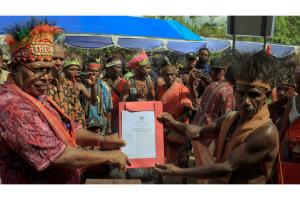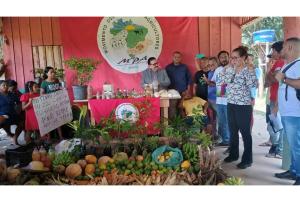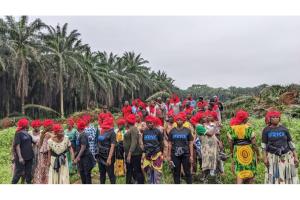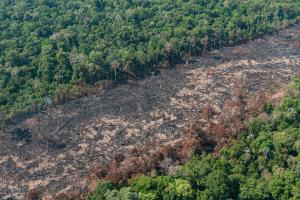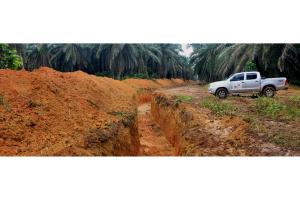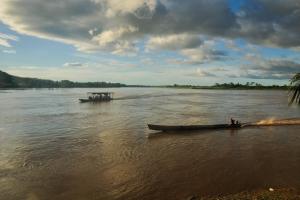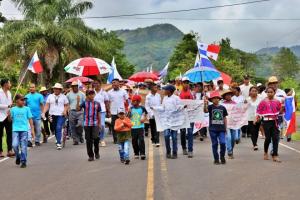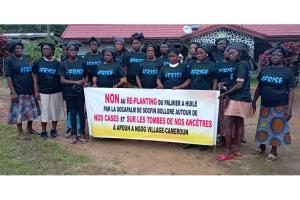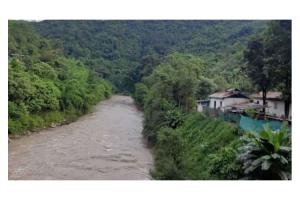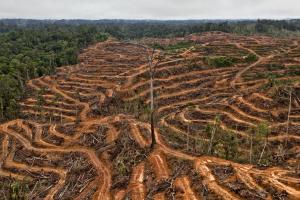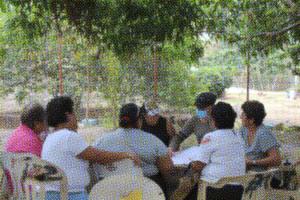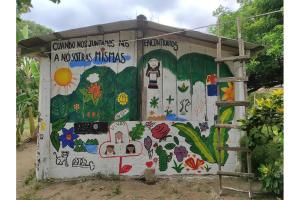Palm Oil
The oil palm tree is native to West Africa. It is an important tree for forest-dependent communities, their cultures and their economies. However, large-scale oil palm monocultures for industrial production (oil and agrofuels) have been driving deforestation and land grabbing in Southeast Asia. More recently, oil palm monocultures are also driving destruction in Africa and Latin America.
Bulletin articles
22 August 2024
Just like the Dutch colonizers in the past did, the Indonesian government, companies and investors consider the land of Papua to be a vast empty territory, a new frontier for extraction and profiteering However, the land of Papua is not empty, but rather home to hundreds of Indigenous Peoples—including the women and men of Kampung Bariat village, who are struggling to ensure control over their ancestral territory and keep it free of oil palm plantations.
Bulletin articles
22 August 2024
Peasant families are threatened with eviction by Brasil Bio Fuels (BBF) oil palm plantation company, with the complicity of the state government. This article shows that the much spoken of ‘bioeconomy’ is not ‘sustainable’ and even less ‘clean’. What it does is destroy communities’ territories, just like fossil fuel-based extractive industries have been doing for a long time.
Bulletin articles
22 August 2024
The company is in the process of renewing part of its oil palm plantations in Edéa. At the end of last year, communities started to mobilize against this process. The community resistance has led the sub-prefect to request Socapalm to stop its activities. This is a first victory of the community but the struggle will continue until SOCAPALM returns the lands to the communities!
Bulletin articles
27 February 2024
The Amazon region is one of the final frontiers of resistance to capital expansion. This is epitomized by the struggles of social activists such as Chico Mendes, as well as by the presence of most of the earth’s remaining indigenous peoples in voluntary isolation. However, different forms of ‘green’ extractivism are currently and increasingly advancing on this territory.
Bulletin articles
26 February 2024
In the Acará Valley, Pará state, the Tembé and Turiwara indigenous peoples, and quilombola and peasant communities are fighting to take back part of the living spaces they traditionally occupied. It is not just a struggle for territory, but one to reverse a history of oppression and injustice. Today, they are denouncing structural violence and state omission.
Bulletin articles
26 February 2024
The expanding agricultural frontier to grow soybean and oil palm, in addition to mining and the potential construction of mega-dams, are advancing upon the living spaces of indigenous and peasant communities. In late 2018, communities organized a coordinating committee to defend their territories and their right to a dignified life.
Bulletin articles
19 December 2023
Almost 30 years of UN climate negotiations have resulted in the establishment of policies and practices that facilitate the constant expansion of the fossil fuel-based economy (and its profits) while hiding its implacable negative impacts for the territories where it expands.
Bulletin articles
19 December 2023
The Afrise women's association launched an international petition to stop the replanting of oil palm monocultures around their homes and over the grave sites of their ancestors. They are denouncing decades of sexual abuse, land dispossession and misery. They are demanding that their territory be returned to them, so that they can lead a life of dignity.
Bulletin articles
25 October 2023
Land related struggles in India’s Northeast states might worsen with the push to expand oil palm plantations on small-farmers and Indigenous land, threatening their food sovereignty and the ancestral practice of Jhum (shifting cultivation). On top of this, a new Forest Amendment Law will facilitate this expansion, jeopardizing further the region’s forests and Indigenous Peoples.
Bulletin articles
22 July 2023
This article tells the story of a women group in Kalimantan called “Hurung Hapakat”, which means “Working Together”. Collectively, and against serious repression, they have reclaimed some land from oil palm plantations in order to also reclaim their food sovereignty, dignity and wisdom. And they are not alone.
Bulletin articles
22 July 2023
Women's organizations are resisting the advance of a monoculture crop that is invading their lands and bringing scarcity and water pollution. In this podcast, they explain their situation and their struggle. The podcast was produced by the groups Women of the Chiapas Coast against Oil Palm and Coastal Women in Rebellion, in collaboration with WRM.
Bulletin articles
16 January 2023
Oil palm plantations are a central cause of deforestation in southeast Mexico. A network of women in Chiapas have organized to denounce the tactics of coercion and deception employed by the State and companies to get peasants to accept this monoculture on their lands. Their struggle is for the land, for their knowledge, and for their voices to be heard.
